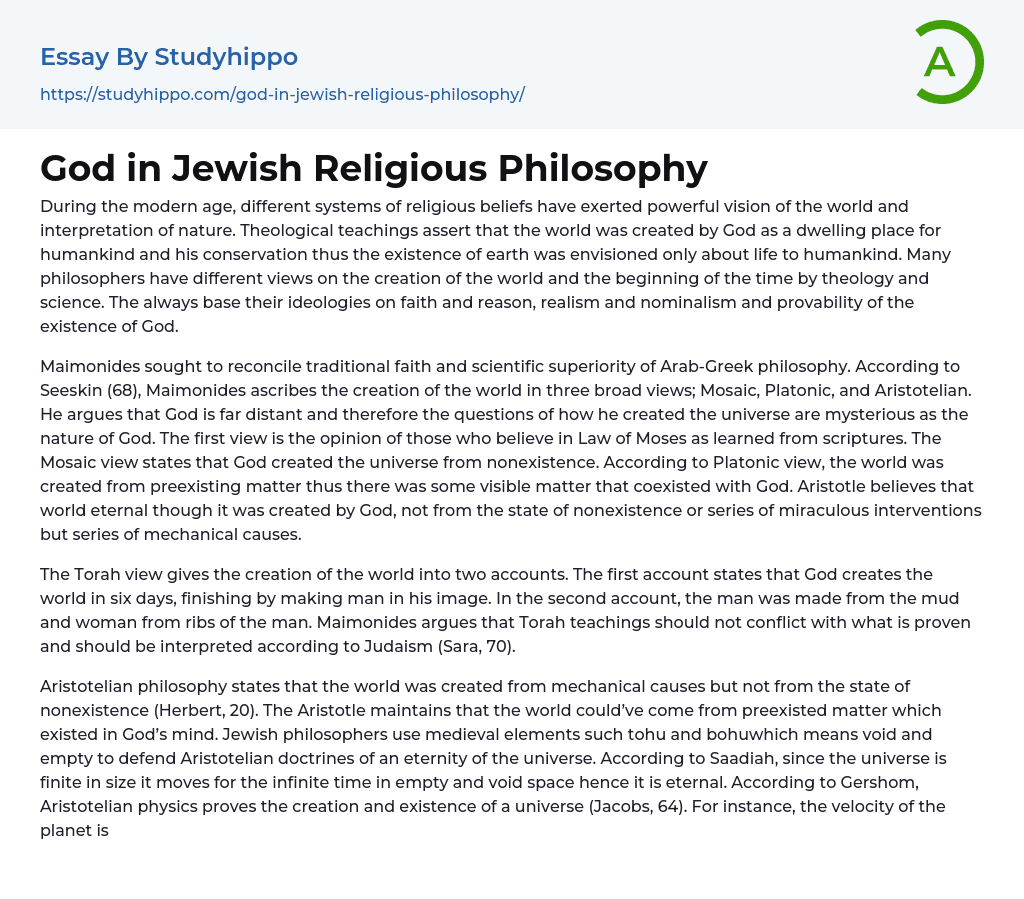During the modern age, different systems of religious beliefs have exerted powerful vision of the world and interpretation of nature. Theological teachings assert that the world was created by God as a dwelling place for humankind and his conservation thus the existence of earth was envisioned only about life to humankind. Many philosophers have different views on the creation of the world and the beginning of the time by theology and science. The always base their ideologies on faith and reason, realism and nominalism and provability of the existence of God.
Maimonides sought to reconcile traditional faith and scientific superiority of Arab-Greek philosophy. According to Seeskin (68), Maimonides ascribes the creation of the world in three broad views; Mosaic, Platonic, and Aristotelian. He argues that God is far distant and therefore t
...he questions of how he created the universe are mysterious as the nature of God. The first view is the opinion of those who believe in Law of Moses as learned from scriptures. The Mosaic view states that God created the universe from nonexistence. According to Platonic view, the world was created from preexisting matter thus there was some visible matter that coexisted with God. Aristotle believes that world eternal though it was created by God, not from the state of nonexistence or series of miraculous interventions but series of mechanical causes.
The Torah view gives the creation of the world into two accounts. The first account states that God creates the world in six days, finishing by making man in his image. In the second account, the man was made from the mud and woman from ribs of the man. Maimonides argues that Torah teachings
should not conflict with what is proven and should be interpreted according to Judaism (Sara, 70).
Aristotelian philosophy states that the world was created from mechanical causes but not from the state of nonexistence (Herbert, 20). The Aristotle maintains that the world could’ve come from preexisted matter which existed in God’s mind. Jewish philosophers use medieval elements such tohu and bohuwhich means void and empty to defend Aristotelian doctrines of an eternity of the universe. According to Saadiah, since the universe is finite in size it moves for the infinite time in empty and void space hence it is eternal. According to Gershom, Aristotelian physics proves the creation and existence of a universe (Jacobs, 64). For instance, the velocity of the planet is the function of rotations it makes around the earth at given time hence the earth was formed from an existing matter and its rotation eternal.
Apophatic theology refers to the description of God by negation mostly in which one asserts what may not be said about God (Costa, 90). Maimonides offers proofs for the existence which were all cosmological argument. He begins a description of God by describing the world thus implying that existence of God from the fact that word exists. It is impossible for the existence of infinite bodies or an infinite number of finite bodies. If the body is limited, it can only have a finite amount of power. Maimonides thinks the argument offers sufficient for believing that God exists, but he seems not to understand that it gives other notions of what God is. To discern God, we have to believe He is not comparable to anything else.
Most religious philosophy
in Jewish community focused on different versions of theism. Most of this theism would flourish according to the culture and traditions. The terms applied to God, and the world was either univocal or analogical. It seemed that many terms used in Jewish tradition to describe God were analogical hence it would be harder to clarify God as omnipresent, real, personal, knowing and creative. Philosophers have utilized thought experiments and languages to draw soundness and richness of the imagination of the existence of God. Philosophers have been cautious in the description of God they know some of the imagined features might be misconceived or overlooked. Nevertheless, Maimonides although addresses the issue of via negative in that the highest form of praise we can give God is silence and insist daily prayers is mandatory as they provide God’s essence. In this analogy, we can say God is merciful to the extent that order of nature exhibits.
Work Cited
- Kenneth Seeskin. Searching for a Distant God: The Legacy of Maimonides. New York:
- Oxford University Press, 2000: 68
- Davidson, Herbert. Maimonides’ Secret Position on Creation. In: I. Twersky, ed. Studies in Medieval Jewish History and Literature. Cambridge, Mass.: Harvard University Press, 1979, p. 16-40
- Jonathan Jacobs, ‘The Epistemology of Moral Tradition: A Defense of a Maimonidean Thesis,” Review of Metaphysics, 64, 1, September 2010, pp. 55-74.
- Klein-Braslavy, Sara. The Creation of the World and Maimonides’ Interpretation of Gen. I-V. Martinus Nijhoff Publishers, Dordrecht: 1986, p. 65-78.
- Da Costa, J. "Can Apophatic Theology Be Applied To Goddessing As Well As To God?”. Feminist Theology 11.1 (2002): 82-98. Web.
- Acceptance essays
- Age Of Enlightenment essays
- Child Observation essays
- Confucianism essays
- Conscience essays
- Critical Reflection essays
- Destiny essays
- Determinism essays
- Empiricism essays
- Environmentalism essays
- Epistemology essays
- Ethics essays
- Ethos essays
- Existence essays
- Existentialism essays
- Fate essays
- Free Will essays
- Functionalism essays
- Future essays
- Good And Evil essays
- Human Nature essays
- Individualism essays
- Meaning Of Life essays
- Metaphysics essays
- Natural Law essays
- Personal Philosophy essays
- Philosophers essays
- Philosophy Of Life essays
- Political Philosophy essays
- Pragmatism essays
- Reality essays
- Relativism essays
- Teaching Philosophy essays
- Time essays
- Transcendentalism essays
- Truth essays
- Utilitarianism essays
- Afterlife essays
- Atheism essays
- Bible essays
- Buddhism essays
- Christian Worldview essays
- Christianity essays
- Confession essays
- Cosmological Argument essays
- Deism essays
- Devil essays
- Existence of God essays
- Faith essays
- Freedom Of Religion essays




